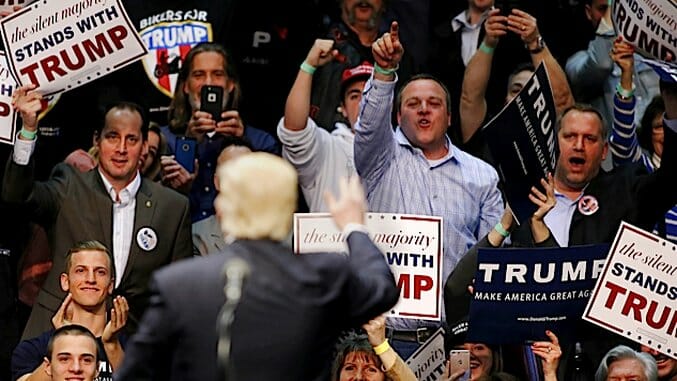There Won’t Be a “Next” Donald Trump. Here’s Why.
Photo courtesy of Getty
According to David Maraniss, during his years as Governor, Bill Clinton always returned a single question, one that his aides never stopped hearing: “What’s next?” What’s next? What’s the next campaign stop? What’s the next race? What’s the next item on the list? What’s next? What’s next? What’s next?
Right now, as far as politics goes, that question looms large in the forefront of the collective imagination. We, frankly, don’t know what’s next. Salvation, when Trump loses. Or another four hell-years of the Orange Presidency. That’s as far ahead as our politics looks.
But what’s next? Assume that the best of all currently possible worlds happens, and a progressive, non-Biden Democrat takes the throne. Suppose we get eight years of reform, climate change action, and greater equality under the law. Suppose, even better, we build an enduring progressive movement, one that outlasts a single Presidency. Best of all, suppose we get an alignment election. Maybe 2020 turns out to be 1932 in new clothes—maybe the Democrat who gets elected in 2020 radically rewrites our political order.
Even if that’s the case, we still need to ask a simple question: Is there another Trump out there?
By Trump, I don’t mean a delusional billionaire man-child with brain parasites. I mean someone who can tap into what Trump tapped into.
What did he tap into? The Orangeman found a political system that was broken. One side, the elite, was staffed by goofy, rigid, slow-blinking suits who recycled lobbyist talking points. On the other side was the public, who desperately wanted change. Of that public, a subsection of them were white supremacist Boomers and disaffected suburbanites with Jet Skis and weird opinions about Muslims. Trump leaned into these voters. Through them, he scored the GOP nomination, obliging the Republicans to vote for him in fear of Hillary. The failures of the Clinton campaign, 40 years of centrism, and a perfect storm of political mistakes led to Donald Trump becoming president. That’s the 2016 election in a nutshell.
So much for the background. Even under the best possible result for 2020, many members of the Trump coalition will still be around. Now, what did Trump do, exactly?
Opinions vary. But the reality’s simple. Trump is not a genius of politics. He’s not a universe-warping world-historical figure who bent the times around him. He’s a grasping showman who found opportunities arranged to his liking, and made the best of a weird situation. As the corrupt Tammany Boss George Plunkitt once said, “”I seen my opportunities and I took ‘em.” That doesn’t make him a force of nature. If lucky breaks were the whole secret to worldly success, than any meth dealer who won the lotto could be the peer of Warren Buffet.
So to answer the question of “Will there be another Trump?”, let’s break down the 2016 situation. First, the scenario. We know the 2016 disaster was a long time coming, and required an incompetent Democrat campaign. Those particular conditions are unlikely to be repeated.
Second, the man. Trump himself is not a gifted or observant man. The only thing he had to do was notice the opportunity, and perform bigoted make-believe in public. Trumps are not particularly special. I doubt there’s anything about him, uniquely, that makes him electorally or politically singular.
So we come to the third and crucial factor, Trump’s base. They’re the most interesting part of the whole equation. 2016 will probably not come again. And we know Trump is not special. So the question of “Will there be another Trump” amounts to “Will the base get excited about anybody, ever, as they do about Trump?” Will white nationalists pick another champion, and stick by him, the way they’ve stuck by Trump.
It’s unlikely. If there is a Trump on the way, he’ll be hard to see. That’s the point of Trump.
A system cannot build him. Trump only became president because he was a rich, famous guy outside of the system. That was crucial. Trump is what sci-fi writer Iain Banks called an Out-of-Context Problem:
The usual example given to illustrate an Outside Context Problem was imagining you were a tribe on a largish, fertile island; you’d tamed the land, invented the wheel or writing or whatever, the neighbours were cooperative or enslaved but at any rate peaceful and you were busy raising temples to yourself with all the excess productive capacity you had, you were in a position of near-absolute power and control which your hallowed ancestors could hardly have dreamed of and the whole situation was just running along nicely like a canoe on wet grass… when suddenly this bristling lump of iron appears sailless and trailing steam in the bay and these guys carrying long funny-looking sticks come ashore and announce you’ve just been discovered, you’re all subjects of the Emperor now, he’s keen on presents called tax and these bright-eyed holy men would like a word with your priests.
Jared Chambers defines an Outside Context Problem as “anything that has heretofore not been expected, due to either lack of imagination, or ability.” They have some similarity to Nassim Nicholas Taleb’s Black Swan events—rare and unpredictable outliers.
That said, it only takes one person to start a trend. Another way to look at Trump is to say: here is a man who has shown the right wing a path. Who will follow the path? Maybe Hawley, or Cotton, or Mike Lee, or any of the other hard right?
None of these mouth-breathers will do it, because they are part of the system that was.
By a way of parallel, take Bernie. Bernie, or someone very like Bernie, will probably get the Democratic nomination in 2020. And after him? Well, everybody who would be the next Bernie is under 40 right now. That’s why Bernie is a generation older than his followers. The system spent 40 years purging progressivism. When progressivism came back, the backers were the very young or the very old. In other words, the people outside of the system.
I need to repeat this, because this part is the whole ball game: These system-breakers are not products of the system. That is why they are successful and noticed. Bernie and Trump are outliers: guys who were outside of the established political order, and survived despite this.
The system is cruel, and it is unfair, and it is unpopular. Political movement belongs to the outsiders now.
On the slim chance Trumps do exist, there will not be more Trumps for at least a decade. Why? Because everyone who has power now, all of the people who might be in a position to come in the next four years—in 2024, or 2028—are still the last crop of Heritage Foundation test-tube clones. The Trump path is dependent on the next Trump being Outside the System.
To wit:
1. There are plenty of people who have Trump’s policies, but do not have his showbiz acumen, his platform, or his ability to stand apart from the political system. (They’re not rich or famous, nor do they have the ability to perform).
2. There are plenty of people waiting in the wings ready to pick up Trump’s base, but they won’t have credibility, because to get in the wings—to be waiting there in the first place—they had to make compromises with the system, and being a part of this system will compromise them already. The people who elected Trump hate the system.
3. Trump himself isn’t Trump. He is now what he was in 1960, and 1970, and 1980, and every decade after that: a rich kid who won the lottery of life.
What’s next? Rising seas, an unending battle, and the making or breaking of America. But for all that, another Trump is unlikely. Trump’s had his lucky breaks. The fact that there’s only one of him is ours.







































